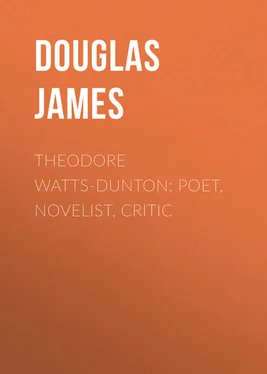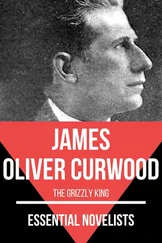James Douglas - Theodore Watts-Dunton - Poet, Novelist, Critic
Здесь есть возможность читать онлайн «James Douglas - Theodore Watts-Dunton - Poet, Novelist, Critic» — ознакомительный отрывок электронной книги совершенно бесплатно, а после прочтения отрывка купить полную версию. В некоторых случаях можно слушать аудио, скачать через торрент в формате fb2 и присутствует краткое содержание. Жанр: literature_19, foreign_antique, foreign_prose, Биографии и Мемуары, на английском языке. Описание произведения, (предисловие) а так же отзывы посетителей доступны на портале библиотеки ЛибКат.
- Название:Theodore Watts-Dunton: Poet, Novelist, Critic
- Автор:
- Жанр:
- Год:неизвестен
- ISBN:нет данных
- Рейтинг книги:4 / 5. Голосов: 1
-
Избранное:Добавить в избранное
- Отзывы:
-
Ваша оценка:
- 80
- 1
- 2
- 3
- 4
- 5
Theodore Watts-Dunton: Poet, Novelist, Critic: краткое содержание, описание и аннотация
Предлагаем к чтению аннотацию, описание, краткое содержание или предисловие (зависит от того, что написал сам автор книги «Theodore Watts-Dunton: Poet, Novelist, Critic»). Если вы не нашли необходимую информацию о книге — напишите в комментариях, мы постараемся отыскать её.
Theodore Watts-Dunton: Poet, Novelist, Critic — читать онлайн ознакомительный отрывок
Ниже представлен текст книги, разбитый по страницам. Система сохранения места последней прочитанной страницы, позволяет с удобством читать онлайн бесплатно книгу «Theodore Watts-Dunton: Poet, Novelist, Critic», без необходимости каждый раз заново искать на чём Вы остановились. Поставьте закладку, и сможете в любой момент перейти на страницу, на которой закончили чтение.
Интервал:
Закладка:
Yet it is not a little singular that this heresy of the sacredness of work should be most flourishing at the very time when the sophism on which it was originally built is exploded; the sophism, we mean, that Nature herself is the result of Work, whereas she is the result of growth. One would have thought that this was the very time for recognizing what the sophism had blinded us to, that Nature’s permanent temper – whatever may be said of this or that mood of hers – is the temper of Sport, that her pet abhorrence, which is said to be a vacuum, is really Work. We see this clearly enough in what are called the lower animals – whether it be a tiger or a gazelle, a ferret or a coney, a bat or a butterfly – the final cause of the existence of every conscious thing is that it should sport. It has no other use than that. For this end it was that ‘the great Vishnu yearned to create a world.’ Yet over the toiling and moiling world sits Moloch Work; while those whose hearts are withering up with hatred of him are told by certain writers to fall down before him and pretend to love.
The worker of the mischief is, of course, civilization in excess, or rather, civilization in wrong directions. For this word, too, has to be newly defined in the Dictionary before mentioned, where you will find it thus given: – Civilization: a widening and enriching of human life. Bastard or Modern Western Civilization: the art of inventing fictitious wants and working to supply them. In bastard civilization life becomes poorer and poorer, paltrier and paltrier, till at last life goes out of fashion altogether, and is supplanted by work. True freedom is more remote from us than ever. For modern Freedom is thus defined: the exchange of the slavery of feudality for the slavery of opinion. Thoreau realized this, and tried to preach men back to common-sense and Nature. Here was his mistake – in trying to preach. No man ever yet had the Nature-instinct preached into him.”
Chapter VII
EAST ANGLIA
Whatever may have been those experiences with the gryengroes which made Groome, when speaking of the gypsies of ‘Aylwin,’ say ‘the author writes only of what he knows,’ it seems to have been after his intercourse with the gypsies that he and a younger brother, Alfred Eugene Watts (elsewhere described), were articled as solicitors to their father. His bent, however, was always towards literature, especially poetry, of which he had now written a great deal – indeed, the major part of the volume which was destined to lie unpublished for so many years. But before I deal with the most important period of Mr. Watts-Dunton’s life – his life in London – it seems necessary to say a word or two about his visits to East Anglia, and especially to the Norfolk coast. There are some admirable remarks upon the East Coast in Mr. William Sharp’s chapter on ‘Aylwinland’ in ‘Literary Geography,’ and he notes the way in which Rhona Boswell links it with Cowslip Land; but he does not give examples of the poems which thus link it, such as the double roundel called ‘The Golden Hand.’
5 5 Among the gypsies of all countries the happiest possible ‘Dukkeripen’ (i.e. prophetic symbol of Natura Mystica) is a hand-shaped golden cloud floating in the sky. It is singular that the same idea is found among races entirely disconnected with them – the Finns, for instance, with whom Ukko, the ‘sky god,’ or ‘angel of the sunrise,’ was called the ‘golden king’ and ‘leader of the clouds,’ and his Golden Hand was more powerful than all the army of Death. The ‘Golden Hand’ is sometimes called the Lover’s Dukkeripen.
Do you forget that day on Rington strand
When, near the crumbling ruin’s parapet,
I saw you stand beside the long-shore net
The gorgios spread to dry on sunlit sand?
Do I forget?
You wove the wood-flowers in a dewy band
Around your hair which shone as black as jet:
No fairy’s crown of bloom was ever set
Round brows so sweet as those the wood-flowers spanned.
I see that picture now; hair dewy-wet:
Dark eyes that pictures in the sky expand:
Love-lips (with one tattoo ‘for dukkerin’ 6 6 Good-luck.
) tanned
By sunny winds that kiss them as you stand.
Do I forget?
The Golden Hand shone there: it’s you forget,
Or p’raps us Romanies ondly understand
The way the Lover’s Dukkeripen is planned
Which shone that second time when us two met.
Blest ‘Golden Hand’!
The wind, that mixed the smell o’ violet
Wi’ chirp o’ bird, a-blowin’ from the land
Where my dear Mammy lies, said as it fanned
My heart-like, ‘Them ’ere tears makes Mammy fret.’
She loves to see her chavi 7 7 Child.
lookin’ grand,
So I made what you call’d a coronet,
And in the front I put her amulet:
She sent the Hand to show she sees me yet.
Blest ‘Golden Hand’!
In the same way that the velvety green of Hunts is seen in the verses I have already quoted, so the softer side of the inland scenery of East Anglia is described in the following lines, where also we find an exquisite use of the East Anglian fancy about the fairies and the foxglove bells.
At a waltz during certain Venetian revels after the liberation from the Austrian yoke, a forsaken lover stands and watches a lady whose child-love he had won in England: —
Has she forgotten for such halls as these
The domes the angels built in holy times,
When wings were ours in childhood’s flowery climes
To dance with butterflies and golden bees? —
Forgotten how the sunny-fingered breeze
Shook out those English harebells’ magic chimes
On that child-wedding morn, ’neath English limes,
’Mid wild-flowers tall enough to kiss her knees?
The love that childhood cradled – girlhood nursed —
Has she forgotten it for this dull play,
Where far-off pigmies seem to waltz and sway
Like dancers in a telescope reversed?
Or does not pallid Conscience come and say,
‘Who sells her glory of beauty stands accursed’?
But was it this that bought her – this poor splendour
That won her from her troth and wild-flower wreath
Who ‘cracked the foxglove bells’ on Grayland Heath,
Or played with playful winds that tried to bend her,
Or, tripping through the deer-park, tall and slender,
Answered the larks above, the crakes beneath,
Or mocked, with glitter of laughing lips and teeth,
When Love grew grave – to hide her soul’s surrender?
Mr. Sharp has dwelt upon the striking way in which the scenery and atmosphere are rendered in ‘Aylwin,’ but this, as I think, is even more clearly seen in the poems. And in none of these is it seen so vividly as in that exhilarating poem, ‘Gypsy Heather,’ published in the ‘Athenæum,’ and not yet garnered in a volume. This poem also shows his lyrical power, which never seems to be at its very best unless he is depicting Romany life and Romany passion. The metre of this poem is as original as that of ‘The Gypsy Haymaking Song,’ quoted in an earlier chapter. It has a swing like that of no other poem: —
‘If you breathe on a heather-spray and send it to your man it’ll show him the selfsame heather where it wur born.’ – Sinfi Lovell.
Читать дальшеИнтервал:
Закладка:
Похожие книги на «Theodore Watts-Dunton: Poet, Novelist, Critic»
Представляем Вашему вниманию похожие книги на «Theodore Watts-Dunton: Poet, Novelist, Critic» списком для выбора. Мы отобрали схожую по названию и смыслу литературу в надежде предоставить читателям больше вариантов отыскать новые, интересные, ещё непрочитанные произведения.
Обсуждение, отзывы о книге «Theodore Watts-Dunton: Poet, Novelist, Critic» и просто собственные мнения читателей. Оставьте ваши комментарии, напишите, что Вы думаете о произведении, его смысле или главных героях. Укажите что конкретно понравилось, а что нет, и почему Вы так считаете.









